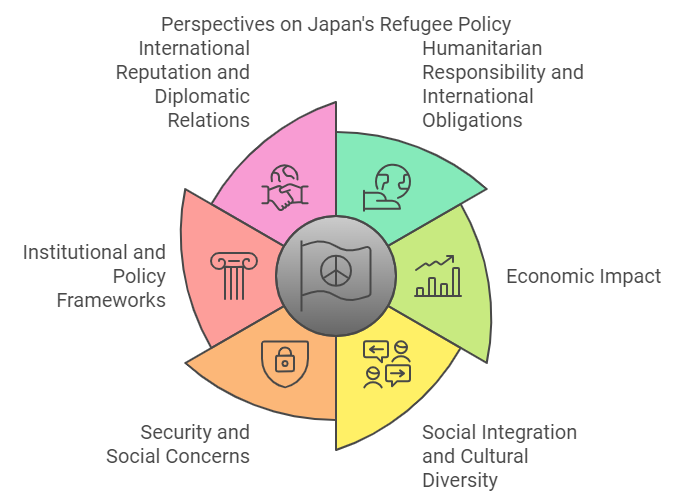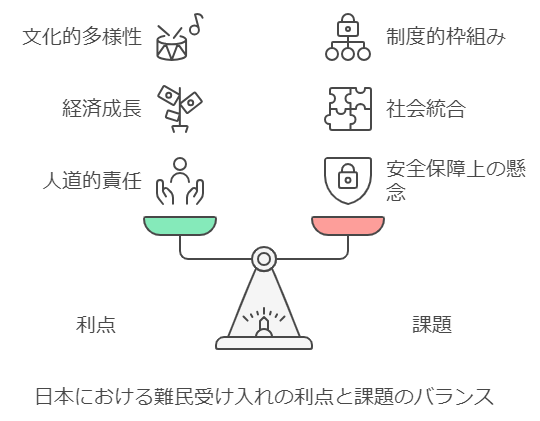(簡単★~難しい★★★★★)語彙難易度★★★

目次
Question: Should Japan accept more refugees?
(日本はもっと多くの難民を受け入れるべきでしょうか?)
トレーニング手順
200~240語程度、3つの観点、目標解答時間:約25分
- 分野・トピック毎の観点とキーワードをまとめる
以下の画像のようなイメージ図にしておくと、記憶に定着するのでおススメ - 自分が書きやすい立場・観点で実際に書く
分からない表現はすぐに調べて15分程度で書く - 続いて、先ほどとは反対意見で書いてみる
分からない表現はすぐに調べて15分程度で書く - そのトピックについて実際に誰かと話す、又は1分スピーチをする
- 同じ分野で3つくらいの意見論述を作成する
例えば、宇宙なら宇宙植民・宇宙採掘・宇宙旅行など
6つの観点 (Perspectives)
単純化したイラストで整理することで、記憶に定着しやすくなります。

観点 (Perspectives)
- 人道的責任と国際的義務 (Humanitarian Responsibility and International Obligations)
難民を受け入れることは、国際社会における日本の人道的責任であり、国際条約に基づく義務です。 - 経済的影響 (Economic Impact)
難民の受け入れは労働力不足の解消や経済成長の一助となる可能性があり、特に高齢化が進む日本にとっては経済的メリットが期待されます。 - 社会的統合と文化的多様性 (Social Integration and Cultural Diversity)
難民の社会統合は難しい課題ですが、多様性を取り入れることで文化的、社会的な活力を生むことも可能です。 - 安全保障と社会的懸念 (Security and Social Concerns)
難民受け入れには、社会的な不安や安全保障上の懸念が伴うこともあり、慎重な対策が求められます。 - 制度と政策の整備 (Institutional and Policy Frameworks)
難民の受け入れには、法的・制度的な整備や支援体制の強化が必要であり、日本の難民認定制度は国際基準と比べて非常に厳格であると批判されています。 - 国際的評価と外交関係 (International Reputation and Diplomatic Relations)
難民受け入れの増加は、日本の国際的評価や外交におけるソフトパワーの向上にもつながります。
キーワード (Keywords)
- refugee acceptance (難民受け入れ)
- humanitarian aid (人道援助)
- labor shortage (労働力不足)
- social integration (社会統合)
- security concerns (安全保障上の懸念)
- cultural diversity (文化的多様性)
- immigration policy (移民政策)
- legal frameworks (法的枠組み)
- international obligations (国際的義務)
- diplomatic relations (外交関係)
使われそうな動詞 (Verbs)
- accept (受け入れる)
- integrate (統合する)
- support (支援する)
- reform (改革する)
- ensure (確保する)
- foster (育成する)
- evaluate (評価する)
- contribute (貢献する)
- mitigate (緩和する)
- address (対処する)
使われそうな形容詞 (Adjectives)
- humanitarian (人道的な)
- inclusive (包括的な)
- diverse (多様な)
- vulnerable (脆弱な)
- economic (経済的な)
- secure (安全な)
- comprehensive (包括的な)
- culturally sensitive (文化的に配慮した)
- responsive (対応力のある)
- equitable (公平な)
使われそうな副詞 (Adverbs)
- humanely (人道的に)
- economically (経済的に)
- inclusively (包括的に)
- securely (安全に)
- responsibly (責任を持って)
- progressively (段階的に)
- culturally (文化的に)
- ethically (倫理的に)
- diplomatically (外交的に)
- effectively (効果的に)
Yes: 日本はもっと難民を受け入れるべきだ
Japan should accept more refugees, as it has a humanitarian responsibility, can benefit economically, and would enhance its international reputation. These factors make refugee acceptance a necessary step for the country.
First, Japan has a humanitarian responsibility and international obligations to accept more refugees. As a signatory of international treaties like the 1951 Refugee Convention, Japan is committed to helping those fleeing persecution and conflict. Accepting more refugees aligns with global humanitarian efforts and shows Japan’s willingness to contribute to solving international crises.
Second, welcoming refugees could help address Japan’s economic challenges. Japan faces a rapidly aging population and a shrinking workforce, which threaten its economic future. Refugees, many of whom are young and able to work, could fill labor shortages in various industries. By integrating refugees into the workforce, Japan can stimulate economic growth and mitigate the effects of its demographic decline.
Finally, accepting more refugees would enhance Japan’s international reputation and diplomatic relations. As one of the world’s largest economies, Japan can increase its global influence by taking a more active role in addressing refugee crises. This would boost Japan’s soft power and show it to be a compassionate global leader, strengthening ties with other nations.
In conclusion, Japan should accept more refugees to fulfill its humanitarian responsibilities, stimulate economic growth, and improve its standing in the international community. These benefits outweigh the challenges of integration. (238 words)
賛成意見の訳と用語
Japan should accept more refugees, as it has a humanitarian responsibility, can benefit economically, and would enhance its international reputation. These factors make refugee acceptance a necessary step for the country.
イントロ: 日本はより多くの難民を受け入れるべき理由
日本は、人道的責任を負っており、経済的利益を得られ、国際的な評価を高めることができるため、より多くの難民を受け入れるべきである。これらの要素により、難民の受け入れは日本にとって必要な措置となっている。
- “humanitarian responsibility”(人道的責任)
類語: “moral responsibility,” “ethical duty”
反語: “neglect of duty,” “indifference” - “benefit economically”(経済的に利益を得る)
類語: “profit financially,” “gain economic advantage”
反語: “suffer economic loss,” “be disadvantaged financially” - “enhance its international reputation”(国際的な評価を高める)
類語: “improve its global image,” “boost its international standing”
反語: “damage its reputation,” “tarnish its global standing” - “necessary step”(必要な措置)
類語: “essential action,” “important measure”
反語: “unnecessary action,” “avoidable step”
First, Japan has a humanitarian responsibility and international obligations to accept more refugees. As a signatory of international treaties like the 1951 Refugee Convention, Japan is committed to helping those fleeing persecution and conflict. Accepting more refugees aligns with global humanitarian efforts and shows Japan’s willingness to contribute to solving international crises.
ボディ1: 日本の人道的責任
まず、日本はより多くの難民を受け入れる人道的責任と国際的義務がある。1951年の難民条約などの国際条約の署名国として、日本は迫害や紛争から逃れてきた人々を助ける責任を負っている。より多くの難民を受け入れることは、世界的な人道的取り組みと一致し、日本が国際的な危機解決に貢献する意思があることを示している。
- “humanitarian responsibility and international obligations”(人道的責任と国際的義務)
類語: “moral duty and international commitments” - “a signatory of international treaties”(国際条約の署名国)
類語: “a party to international agreements”
反語: “non-signatory,” “non-member” - “global humanitarian efforts”(世界的な人道的取り組み)
類語: “international aid efforts,” “worldwide humanitarian initiatives”
反語: “selfish actions,” “nationalistic policies” - “aligns with”(~と一致する)
類語: “matches,” “corresponds with”
反語: “conflicts with,” “diverges from”
Second, welcoming refugees could help address Japan’s economic challenges. Japan faces a rapidly aging population and a shrinking workforce, which threaten its economic future. Refugees, many of whom are young and able to work, could fill labor shortages in various industries. By integrating refugees into the workforce, Japan can stimulate economic growth and mitigate the effects of its demographic decline.
ボディ2: 日本の経済的利益
次に、難民を受け入れることは、日本の経済的課題に対応するのに役立つかもしれない。日本は急速な高齢化と労働力の減少に直面しており、これが経済の将来を脅かしている。多くの若くて働ける難民は、さまざまな産業における労働力不足を補うことができる。難民を労働力として統合することで、日本は経済成長を促進し、人口減少の影響を緩和することができる。
- “economic challenges”(経済的課題)
類語: “economic difficulties,” “financial hurdles”
反語: “economic advantages,” “financial ease” - “rapidly aging population”(急速に高齢化する人口)
類語: “fast-growing elderly population”
反語: “young and growing population” - “shrinking workforce”(労働力の減少)
類語: “declining labor force,” “diminishing workforce”
反語: “expanding workforce,” “growing labor force” - “stimulate economic growth”(経済成長を促進する)
類語: “boost economic development,” “spur financial growth”
反語: “stagnate economic progress,” “hinder growth”
Finally, accepting more refugees would enhance Japan’s international reputation and diplomatic relations. As one of the world’s largest economies, Japan can increase its global influence by taking a more active role in addressing refugee crises. This would boost Japan’s soft power and show it to be a compassionate global leader, strengthening ties with other nations.
ボディ3: 国際的評価の向上
最後に、より多くの難民を受け入れることは、日本の国際的な評価と外交関係を向上させるだろう。世界有数の経済大国である日本は、難民危機への積極的な対応を通じて、世界的な影響力を高めることができるだろう。これにより、日本のソフトパワーが強化され、他国との関係が強化され、思いやりのあるグローバルリーダーとしての地位が示される。
- “enhance international reputation”(国際的な評価を高める)
類語: “boost global standing,” “improve international prestige”
反語: “damage international reputation,” “tarnish global standing” - “diplomatic relations”(外交関係)
類語: “foreign relations,” “international diplomacy”
反語: “strained relations,” “diplomatic conflict” - “increase its global influence”(国際的な影響力を高める)
類語: “expand global reach,” “increase international power”
反語: “diminish global influence,” “lose international standing” - “soft power”(ソフトパワー)軍事力に頼らず文化や外交を通じて影響力を持つこと。
類語: “cultural influence,” “diplomatic power”
反語: “hard power,” “military power”
In conclusion, Japan should accept more refugees to fulfill its humanitarian responsibilities, stimulate economic growth, and improve its standing in the international community. These benefits outweigh the challenges of integration.
結論: 日本が難民を受け入れるべき理由
結論として、日本は人道的責任を果たし、経済成長を促進し、国際社会における地位を向上させるために、より多くの難民を受け入れるべきである。これらの利点は、統合に関する課題を上回るものである。
- “humanitarian responsibility”(人道的責任)
類語: “moral responsibility,” “ethical duty”
反語: “neglect of duty,” “indifference” - “benefit economically”(経済的に利益を得る)
類語: “profit financially,” “gain economic advantage”
反語: “suffer economic loss,” “be disadvantaged financially” - “enhance its international reputation”(国際的な評価を高める)
類語: “improve its global image,” “boost its international standing”
反語: “damage its reputation,” “tarnish its global standing” - “necessary step”(必要な措置)
類語: “essential action,” “important measure”
反語: “unnecessary action,” “avoidable step”

No: 日本はより多くの難民を受け入れるべきではない
Japan should not accept more refugees, as it faces significant challenges related to social integration, security concerns, and its existing institutional framework. These issues make increasing refugee intake difficult for the country.
First, social integration poses a major challenge. Japan has a largely homogenous society, and integrating refugees from different cultural backgrounds could create tensions. Without proper support, refugees might face difficulties adapting to Japanese society, leading to social isolation or friction between communities. This would complicate efforts to create a harmonious multicultural society.
Second, there are valid security and social concerns related to accepting more refugees. While most refugees seek safety, the influx of large numbers could strain public services and heighten fears about crime or terrorism. Ensuring national security while maintaining public trust would require significant resources and careful planning.
Finally, Japan’s current institutional and policy frameworks for handling refugees are underdeveloped. Japan’s refugee acceptance process is one of the strictest in the world, and increasing the number of refugees without improving this system could lead to administrative inefficiencies and inadequate support for those seeking asylum. Strengthening these frameworks should be a priority before increasing refugee intake.
In conclusion, Japan should not accept more refugees until it addresses the challenges of social integration, security, and institutional preparedness. Focusing on these areas first will ensure the country is better equipped to handle refugee issues in the future. (232 words)
反対意見の訳と用語
Japan should not accept more refugees, as it faces significant challenges related to social integration, security concerns, and its existing institutional framework. These issues make increasing refugee intake difficult for the country.
イントロ:日本はより多くの難民を受け入れるべきではない理由
日本は、社会統合、治安問題、既存の制度的枠組みに関する重要な課題に直面しているため、より多くの難民を受け入れるべきではない。これらの問題により、難民受け入れの拡大が日本にとって困難なものとなっている。
- “social integration”(社会統合)
類語: “assimilation,” “social inclusion”
反語: “segregation,” “exclusion” - “existing institutional framework”(既存の制度的枠組み)
類語: “current system,” “administrative structure”
反語: “new system,” “innovative framework” - “refugee intake”(難民の受け入れ)
類語: “refugee admission,” “refugee acceptance”
反語: “refugee rejection,” “refugee exclusion”
First, social integration poses a major challenge. Japan has a largely homogenous society, and integrating refugees from different cultural backgrounds could create tensions. Without proper support, refugees might face difficulties adapting to Japanese society, leading to social isolation or friction between communities. This would complicate efforts to create a harmonious multicultural society.
ボディ1:社会統合の課題
まず、社会統合は大きな課題である。日本は主に単一民族の社会であり、異なる文化的背景を持つ難民の統合は緊張を生む可能性がある。適切な支援がなければ、難民は日本社会に適応するのが難しくなり、社会的孤立や地域社会間の摩擦を引き起こす可能性がある。これは、調和のとれた多文化社会を作る努力を複雑にするだろう。
- “homogenous society”(単一民族社会)
類語: “uniform society,” “monocultural society”
反語: “diverse society,” “multicultural society” - “create tensions”(緊張を生む)
類語: “cause friction,” “generate conflict”
反語: “foster harmony,” “create unity” - “social isolation”(社会的孤立)
類語: “alienation,” “marginalization”
反語: “social inclusion,” “integration” - “harmonious multicultural society”(調和のとれた多文化社会)
類語: “peaceful multicultural society,” “inclusive society”
反語: “divided society,” “conflicted society”
Second, there are valid security and social concerns related to accepting more refugees. While most refugees seek safety, the influx of large numbers could strain public services and heighten fears about crime or terrorism. Ensuring national security while maintaining public trust would require significant resources and careful planning.
ボディ2:治安と社会的懸念
次に、より多くの難民を受け入れることに関連する治安と社会的懸念は正当なものだ。ほとんどの難民は安全を求めているが、大量の難民の流入は公共サービスに負担をかけ、犯罪やテロに対する恐怖を高める可能性がある。国家の安全を確保しながら、国民の信頼を維持するには、多大な資源と慎重な計画が必要である。
- “valid security and social concerns”(正当な治安および社会的懸念)
類語: “legitimate concerns,” “reasonable fears”
反語: “unfounded concerns,” “baseless fears” - “influx of large numbers”(大量の流入)
類語: “surge of refugees,” “mass arrival”
反語: “outflow of people,” “decrease in arrivals” - “strain public services”(公共サービスに負担をかける)
類語: “overburden public services,” “tax public resources”
反語: “ease the strain on services,” “relieve pressure on public systems” - “maintaining public trust”(国民の信頼を維持する)
類語: “preserving public confidence,” “upholding trust”
反語: “eroding public trust,” “losing confidence”
Finally, Japan’s current institutional and policy frameworks for handling refugees are underdeveloped. Japan’s refugee acceptance process is one of the strictest in the world, and increasing the number of refugees without improving this system could lead to administrative inefficiencies and inadequate support for those seeking asylum. Strengthening these frameworks should be a priority before increasing refugee intake.
ボディ3:制度の未整備
最後に、日本の難民対応に関する現在の制度的および政策的枠組みは未整備である。日本の難民受け入れプロセスは世界でも最も厳しいものであり、この制度を改善せずに難民の数を増やすことは、行政の非効率や亡命希望者への不十分な支援を招く可能性がある。難民受け入れを増やす前に、これらの枠組みを強化することが優先されるべきである。
- “institutional and policy frameworks”(制度的および政策的枠組み)
類語: “administrative systems,” “policy structures”
反語: “lack of framework,” “absence of structure” - “strictest in the world”(世界で最も厳しい)
類語: “most rigid,” “most stringent”
反語: “most lenient,” “most relaxed” - “administrative inefficiencies”(行政の非効率性)
類語: “bureaucratic delays,” “governmental inefficiencies”
反語: “administrative efficiency,” “effective administration” - “inadequate support”(不十分な支援)
類語: “insufficient assistance,” “lacking support”
反語: “adequate support,” “sufficient assistance”
In conclusion, Japan should not accept more refugees until it addresses the challenges of social integration, security, and institutional preparedness. Focusing on these areas first will ensure the country is better equipped to handle refugee issues in the future.
結論:難民問題への対応強化が先決
結論として、日本は、社会統合、治安問題、制度的準備といった課題に取り組むまで、より多くの難民を受け入れるべきではない。まずこれらの分野に焦点を当てることで、将来、日本が難民問題により適切に対応できるようになるだろう。
- “address the challenges”(課題に取り組む)
類語: “tackle the issues,” “deal with the challenges”
反語: “ignore the challenges,” “avoid the issues” - “institutional preparedness”(制度的準備)
類語: “institutional readiness,” “administrative preparedness”
反語: “lack of preparedness,” “unpreparedness” - “equipped to handle”(対処できる準備がある)
類語: “ready to manage,” “prepared to deal with”
反語: “ill-equipped,” “unprepared to handle” - “refugee issues”(難民問題)
類語: “asylum issues,” “refugee concerns”
まとめ
学習振り返りコラム: 難民受け入れに関する賛成・反対論の比較
今回の学習では、日本がより多くの難民を受け入れるべきかというテーマに関する賛成意見と反対意見を比較しながら、英検1級のエッセイで重要な論理的な説得力のある文章展開と、汎用的に使える語彙やフレーズを学びました。これらのポイントを振り返り、英検1級のライティング対策にどう活かせるかを考えていきましょう。
論理的なエッセイを書くコツ
エッセイを書く上で、まず最も重要な点は、論理的な構成です。今回の賛成・反対両方のエッセイでは、それぞれの主張をサポートするために、明確なポイントが段落ごとに提示されています。
- 賛成意見では、「人道的責任」「経済的利益」「国際的評価の向上」という3つの主な論点が順を追って展開されており、各段落でその論点を支える具体的な事例や理由が述べられています。
- 反対意見では、「社会統合の課題」「治安と社会的懸念」「制度の未整備」といった問題に焦点が当てられ、それぞれの問題点が具体的に説明されています。
ここでのポイントは、トピックセンテンス(各段落の冒頭で述べるメインアイデア)を明確にし、その後にそれを支える論拠を提示することです。これにより、読み手にとって論理の流れが明確になり、説得力が増します。
汎用的に使える語彙やフレーズ
今回のテーマでは、難民受け入れや国際問題に関する語彙やフレーズを学ぶことができました。これらは、他のトピックでも応用可能であり、エッセイの完成度を高めるために役立ちます。
- “humanitarian responsibility”(人道的責任)
- 国際問題や人道支援に関するトピックで広く使用できるフレーズです。
- 他のトピックにも応用可能で、例として「医療支援」「貧困救済」などがあります。
- “economic benefits”(経済的利益)
- これはさまざまなトピックで使用できる表現です。例えば、移民政策や国際貿易に関する議論でも利用可能です。
- “social integration”(社会統合)
- 多文化社会や移民問題に関する議論で頻繁に使われるフレーズです。移民の受け入れや外国人労働者の統合問題に関連するエッセイに適しています。
- “institutional frameworks”(制度的枠組み)
- 政治や経済に関する問題を論じる際に使える表現で、特定の政策や法制度についての議論で活用できます。
これらのフレーズは、他のトピックや状況に応じて応用することで、説得力のあるエッセイを書く際に非常に有用です。
エッセイ全体の流れと結論のまとめ方
結論の段落では、賛成・反対の意見にかかわらず、自分の主張を明確にし、それまでに提示した論点を簡潔にまとめることが求められます。
- 賛成意見の結論では、難民受け入れが「人道的責任」「経済的利益」「国際的評価の向上」という利点を強調しており、これらの利点が課題を上回ると主張しています。
- 反対意見の結論では、「社会統合」「治安」「制度的準備」の課題に対処する必要があることが強調され、難民受け入れを増やす前にこれらの問題を解決すべきだと結論付けています。
このように、結論で一貫性を保つことが、エッセイ全体の説得力を高める鍵です。
まとめ
今回のエッセイでは、説得力のある論理的な構成の重要性と、幅広いトピックに応用可能な語彙やフレーズの学習ができました。英検1級のエッセイでは、明確な論理展開と豊富な語彙が求められます。これらを意識しながら、引き続きさまざまなテーマで練習し、より高いレベルのライティングスキルを身につけましょう。
英検1級英作文(意見論述・要約問題)・二次試験(面接)リストはコチラ
英検1級トピック探しにおススメのサイト:Britanica ProCon.org
英作文(意見論述・要約問題)対策テキスト

「どんなテキストがおすすめですか?」とよく聞かれるのですが、「問題量が多い」ものと「知識量を増やせるもの」の2種類を準備すると良いかと思います。
また、あまりにも文法解説が長いテキストは、英検1級対策としては、「?」という感じがします。
「何を、どんな観点で、どう伝えるか」にフォーカスして書かれたテキストを選んでください。
英作文テキストは、「最低でも3ラウンドする」。語彙や表現を増やす系のテキストは「最低でも5ラウンドする」つもりで、1ページごとに時間をかけすぎず、分からない時はすぐにググりながらテンポよく進めていきます。




